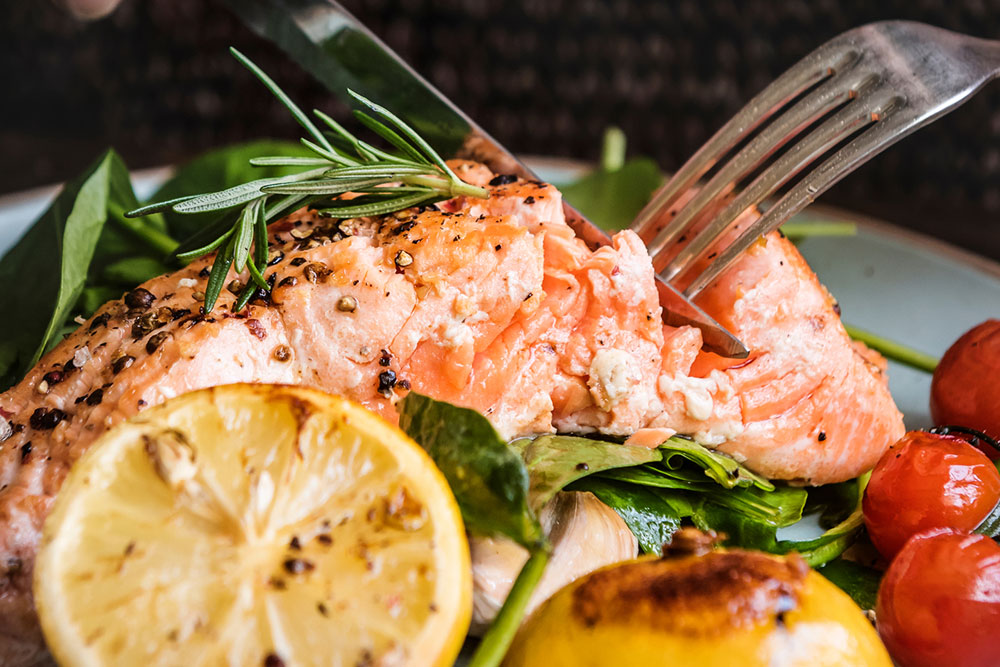9 brain-boosting foods that help fight dementia

Dementia can be a difficult condition to deal with. It not only impacts the individual’s memories but also changes one’s lifestyle. Dementia can lead to confusion, fear, and frustration in patients, and it can be challenging for them and their loved ones. However, some exercises and food habits can help lower the risk of dementia. Including some brain-boosting foods as a staple is the first step to living a life with healthy cognitive ability.
Salmon
Fatty fish like salmon, mackerel, sardines, and trout are excellent sources of omega-3 fatty acids, which are crucial for maintaining brain health. Docosahexaenoic acid (DHA), a type of omega-3 fatty acid, is a major structural component of the brain. Found in high levels of fatty fish, it is essential for maintaining healthy brain cells and promoting cognitive function. Eicosapentaenoic acid (EPA), another omega-3 fatty acid, has anti-inflammatory effects that protect the brain from damage. To reap the brain-boosting benefits of omega-3s, include fatty fish by grilling or baking salmon. Adding sardines to salads or sandwiches or enjoying mackerel with whole-grain crackers is also an option.
Blueberries
Berries are highly recommended for heart and brain health. They are potent food that protects vital organs against potential damage. Berries like blueberries, strawberries, and blackberries can be added to the menu. Research indicates that the flavonoids found in berries may help combat age-related cognitive decline. Berries can easily be incorporated into your diet by adding them to salads, smoothies, yogurt, or cereals. Consuming berries at least twice a week is recommended to reap their potential benefits.
Beans
For a healthier brain, beans must be included regularly in meals. Beans are not only low in fat and calorie content, but they also have high fiber and protein. They help keep the mind sharp and aid in rest and rejuvenation. Research also suggests that eating beans regularly can help lower the risk of developing Alzheimer’s disease.
Quinoa
Quinoa is a great way to add iron, vitamin B, and complex carbohydrates. Complex carbohydrates are great for the brain. They provide the brain with a steady supply of energy and can help the brain maintain its normal levels of function. Iron boosts attention and concentration, while vitamin B releases chemicals that assist with memory creation and storage.
Dark chocolate
Dark chocolates offer several brain benefits, particularly those with a high cocoa content. Flavonoids in dark chocolate enhance cognitive function and improve blood flow to the brain. It also contains caffeine and theobromine, stimulating brain activity and improving mood and concentration. Enjoying a small piece of dark chocolate as a treat, adding cocoa powder to smoothies or oatmeal, or using dark chocolate chips in baking recipes are delightful ways to incorporate this brain-boosting food.
Green tea
Green tea is rich in antioxidants and offers several benefits for brain health. L-Theanine is an amino acid found in green tea. It crosses the blood-brain barrier and has calming effects on the brain. It promotes relaxation and reduces anxiety. The caffeine in green tea also improves brain function, mood, and memory. It also has powerful antioxidants that protect the brain from oxidative stress and reduce the risk of cognitive decline. Enjoy a cup of green tea in the morning or afternoon, use matcha powder in smoothies or as a tea, or combine green tea with lemon and honey for a refreshing drink.
Spinach
Spinach, along with other leafy green vegetables, is a rich source of vitamin E. It also contains high amounts of folate. It is believed that folate can help preserve brain health by lowering homocysteine levels. It is an amino acid that can be found in the blood. Although the direct link between the two is yet to be determined, it is believed that high homocysteine levels can damage nerve cells. Adding spinach gives the body the necessary amount of folate or folic acid, which helps break down the amino acid. High levels of homocysteine have also been shown to have a higher risk of heart disease. Aside from spinach, one can use kale, collard, and broccoli. Add it to soups, salads, cooked veggies, or smoothies.
Peanut
Peanuts and peanut butter are rich sources of healthy fats and vitamin E. Both are ingredients that can keep the heart and brain healthy and maintain their function. However, people need to be mindful and eat these in moderation. Overeating might lead to health concerns like increased cholesterol levels. Add peanuts to the salad to add crunch and healthy fats to the bowl. Apple slices and peanut butter or banana peanut butter toast are classic and satisfying snacks.
Sunflower seeds
Seeds, like nuts, are rich in healthy fats and essential vitamins and minerals. Sunflower seeds are a healthy source of monounsaturated and polyunsaturated fatty acids. They also carry a good supply of vitamin E. Sunflower seeds can be added to salads, vegetables, oatmeal, or smoothies to make them healthier. They also deliver the required dose of health, boost the brain, and help prevent dementia. In addition, nuts and seeds also add to the meal’s protein content. It assists the neurons in the brain to communicate with the rest of the body.